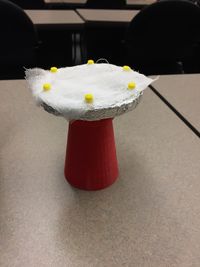{777}}
Title of the device or system
Project developed by Shaunakmhatre (talk) 06:56, 6 December 2018 (PST)
Template:Statusboxtop Template:Status-prototype You can help Appropedia by contributing to the next step in this OSAT's status. Template:Boxbottom
Abstract
- Dew is nothing but water in its purest form. So if we could find a way to collect this dew, we would probably eliminate need of water purification. There are many places across the world where it stays humid throughout the year and it would be a huge help to community if we provide something like this to them.
This can be done on a large scale easily without much of a cost addition.
Bill of Materials
- Aluminium foil
- Piece if cloth/Fabric
- PLA for printing main components
- You can view and download my product design at https://www.youmagine.com/designs/water-dew-collector
Tools needed for fabrication of the OSAT
- MOST Delta RepRap or similar RepRap 3-D printer
Skills and Knowledge Necessary to Make the OSAT
Technical Specifications and Assembly Instructions
- #Print the flask as provided STL. #Supports needs to be generated to print the funnel. Once you are through with the printing, wrap aluminium foil on top surface of funnel and attach your piece of fabric on top of funnel as shown in figure
- Print time estimate: 4 Hours
- Assembly time estimate: 10 mins
Common Problems and Solutions
- Only problem with this product while printing is removal of supports generated.
- Be gentle, and take down supports carefully without damaging funnel.
- Give high infill for the funnel since it has to be leak proof and waterproof.
Cost savings
- Estimate Costs : $2- $3
- Commercial equivalent : Is not being produced on commercial level but can replace water purifiers costing around $50.
- $ savings and % savings: Minimum of $46 & approximately 96% (At least)
Benefited Internet Communities
- Name and add links to at least 5 using single brackets around [url name]
References
- The sources of information (e.g. engineering handbooks, journal articles, government documents, webpages, books, magazine articles etc.). References should use the <ref> </ref> and <references/> tags and can be in any format but should include all the information necessary for someone else to find the same information you did. For example: [1]
- ↑ web page: Inhabitat student project work on dew water collection each night under Environment (2013) Available: https://inhabitat.com/student-designed-chaac-ha-water-collector-can-harvest-2-5-liters-of-drinking-water-from-dew-each-night/
[[Category:Water]]. [[Category:Environment]]. [[Category:Water]]. [[Category:Purification]].
